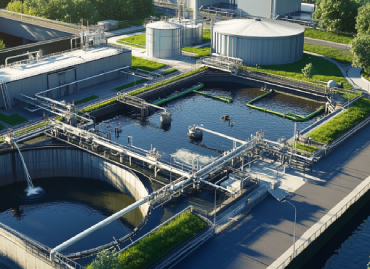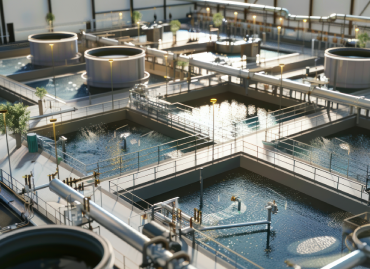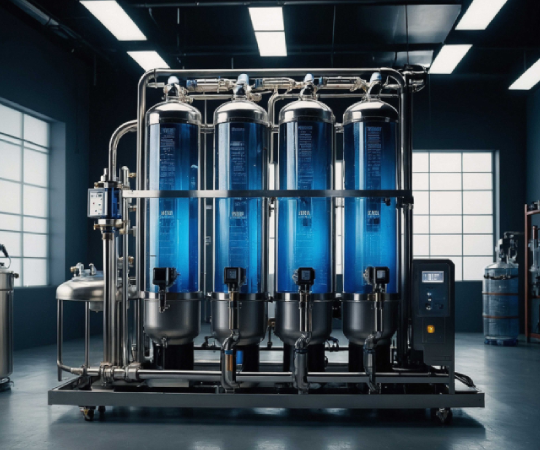- By Admin
- 14 Aug 2025
- ETP Plant
Comprehensive Water and Wastewater Treatment Solutions for Airports and Railways Using STP, ETP, RO
As India's transportation infrastructure continues to modernise, airports and railway stations are evolving into key hubs of activity. Facilities like Chhatrapati Shivaji Maharaj International Airport in Mumbai and major railway junctions in Maharashtra cater to millions of passengers daily. This immense footfall necessitates a huge amount of water, not only for passenger amenities but also for operational purposes like cooling, sanitation, and maintenance.
Water is crucial for a variety of operations in airports and railways. Drinking water is provided to travellers, washrooms need a consistent water supply, and HVAC systems require treated water for air conditioning. Additionally, workshops and maintenance depots in railway stations and airports use water for washing engines, carriages, and various technical equipment.
"In transportation hubs like airports and railway stations, water is more than a necessity—it’s part of the passenger experience. Managing water usage and wastewater responsibly reflects operational excellence and environmental commitment. Efficient treatment systems support hygiene, conserve resources, and meet sustainability goals without compromising service standards."
Types of Wastewater Generated in Airports and Railways
Wastewater in airports and railway stations is generated from a variety of sources, including washrooms, food courts, cleaning operations, and maintenance workshops. The wastewater can be divided into several categories, including sanitary sewage, greywater, and industrial effluents.
Sanitary sewage originates from toilets, sinks, and hand-washing areas. Greywater is produced in wash basins, cleaning operations, and HVAC systems. Industrial effluents, such as oily wastewater, are a byproduct of mechanical workshops and maintenance depots. Additionally, cooling towers generate chemically treated blowdown water, and food courts and lounges produce grease-laden wastewater. Each of these effluent streams requires specialised treatment to ensure safe disposal or reuse.


Importance of STPs and ETPs in Treatment Systems
Efficient wastewater management is essential to minimise environmental impact and ensure operational compliance. Airports and railway stations typically employ Sewage Treatment Plants (STPs) and Effluent Treatment Plants (ETPs) for treating domestic and industrial wastewater. STPs are used for sanitary sewage and greywater, while ETPs handle oily, chemical-laden, and industrial effluents.
Biological treatments such as MBBR (Moving Bed Biofilm Reactor) or SBR (Sequencing Batch Reactor) are commonly used for sanitary sewage. After biological treatment, tertiary filtration processes, such as sand filtration or activated carbon, are used to purify the water further before it is either reused or safely discharged. For industrial effluents, oil-water separators, pH correction, and coagulation processes are often required to remove contaminants.
Water Recycling and Reuse
One of the key objectives for airports and railway stations is to reduce dependency on municipal water supply and minimise freshwater consumption. By using advanced filtration systems like Reverse Osmosis (RO), Membrane Bioreactors (MBR), and Ultrafiltration (UF), treated water can be reused for various non-potable applications, including landscape irrigation, vehicle washing, and even HVAC systems.
These water treatment systems also make it possible to recycle treated wastewater for toilet flushing, platform cleaning, and other cleaning operations. This significantly reduces freshwater demand and supports sustainability goals.
Automation and IoT for Efficiency
Automation is playing a pivotal role in improving the efficiency of water treatment systems at airports and railway stations. With IoT-based monitoring systems, real-time data collection allows for predictive maintenance, ensuring that the treatment plants run optimally. SCADA (Supervisory Control and Data Acquisition) systems enable remote monitoring and control of water treatment operations, leading to improved efficiency and reduced downtime.
These technologies ensure that water treatment plants are functioning in line with the required regulatory standards while optimising resource use and operational costs. The integration of these smart systems is a key step toward achieving environmental sustainability in transit facilities.
Rainwater Harvesting and Sustainable Water Use
Rainwater harvesting is another essential component of water management in airports and railway stations. Capturing and storing rainwater helps reduce reliance on municipal water supplies. This harvested water can be filtered and used for non-potable applications, such as landscaping and cleaning, further supporting the sustainability efforts.
Many modern airports and railway stations are also exploring Zero Liquid Discharge (ZLD) systems, where all wastewater is treated and reused on-site, ensuring that no water is discharged into the environment.
Tailored Water Solutions for High-Volume Facilities
We specialise in providing customised water treatment solutions designed for high-traffic transit hubs like airports and railway stations. Our services include site surveys, system design, installation, automation, and after-sales support. We offer modular and compact treatment plants that fit into space-constrained areas, allowing efficient installation and operation.
Our comprehensive solutions include STPs, ETPs, WTPs, and RO systems, which are tailored to the unique needs of each facility. Whether it's retrofitting old systems or implementing new ones, we ensure that our solutions help reduce water costs, meet environmental standards, and promote sustainable operations in airports and railway stations.
Summary And Conclusion
Water and wastewater management are essential components of the modern airport and railway station infrastructure. By implementing specialised STPs, ETPs, RO systems, and advanced filtration technologies, these high-footfall facilities can effectively manage wastewater, reduce freshwater consumption, and ensure compliance with environmental regulations. Automation, real-time monitoring, and rainwater harvesting further contribute to sustainability efforts, helping reduce operational costs and minimise environmental impact. Customised water treatment solutions help optimise resource use, contributing to both operational efficiency and environmental responsibility.































































